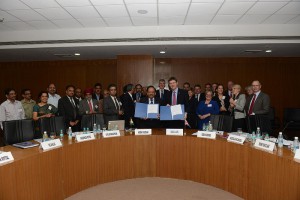25th November 2014 New Delhi, India
UK India Science and Innovation Council 2014 delivered and Newton Bhabha Fund formally launched!
The UK’s Minister for Universities, Science and Cities, Greg Clark was in Delhi earlier in November for two and a half days to take stock of UK India collaborations in all three areas in his portfolio – Education, Science and Cities!
He landed in Delhi with a delegation of 30 distinguished dignitaries from the arena of education, science and innovation. These included FCO’s Chief Scientific Adviser, Prof Robin Grimes, Chief Executives of three Research Councils and Innovate UK, University Vice Chancellors, senior delegates from the Royal Society, Royal Academy of Engineering and the British Academy as well as a number of education and research funding bodies in the UK.
In the afternoon of the 12th, Minister Clark co-chaired the Fourth UK India Science and Innovation Council (SIC) with his newly appointed counterpart Dr Harsh Vardhan, India’s Minister for Science and Technology, on only his second day in the job. We were really pleased that both new ministers agreed to honour the commitments made by their predecessors to hold the meeting – a sure sign of how enthusiastic both countries are to work together in this area.
 At the SIC, the main news was the formal signing of a memorandum of understanding (MoU) to seal the agreement on the Newton Bhabha Fund. Since the announcement of the Newton Fund by the UK in December 2013, the Science and Innovation Team in India have been working with partners in both countries to agree a suite of new programmes together. During the year, two UK India S&I Task Force meetings, one in India and the other in the UK, had agreed to the work plan to put in place the Newton Bhabha Fund and a few priority themes that it would focus on. Following a lot of work behind the scenes to agree the text of the MoU with the Department of Science and Technology, and the MEA, we were able to agree the final text of the MoU just in time for the ministers to approve it in the meeting!
At the SIC, the main news was the formal signing of a memorandum of understanding (MoU) to seal the agreement on the Newton Bhabha Fund. Since the announcement of the Newton Fund by the UK in December 2013, the Science and Innovation Team in India have been working with partners in both countries to agree a suite of new programmes together. During the year, two UK India S&I Task Force meetings, one in India and the other in the UK, had agreed to the work plan to put in place the Newton Bhabha Fund and a few priority themes that it would focus on. Following a lot of work behind the scenes to agree the text of the MoU with the Department of Science and Technology, and the MEA, we were able to agree the final text of the MoU just in time for the ministers to approve it in the meeting!
Signing the agreements, the two Ministers welcomed the progress made in developing individual programmes under the various strands of Newton-Bhabha, to name a few:
- Fellowships for Leaders in Innovation, to offer training in taking ideas through to market
- PhD placements for students to spend short periods of time in the UK or India
- a joint research in call in mental health and substance abuse
- joint research centres in cancer biology, neuroscience and antimicrobial resistance (call already held)
- the Global Research Programme on Women and Child Health
- a joint research centre in renewable energy technologies
- an expansion of the programme of Industrial R&D cooperation, the first awards of which were made earlier this year
The ministers also acknowledged a number of upcoming workshops being led by Research Councils UK (RCUK) and partners in India in areas ranging from mega cities and air pollution; healthy aquaculture; sustainable water resources for food-energy-ecosystem services to the social sciences of data management, social media, and urban transformations.
The enthusiasm to continue on this fast-climbing trajectory is evident in the wide array of future opportunities agreed to be explored further. These include, among other things, the role of science communication and public engagement in the translation of research, and the representation of women in leadership roles.
You can read the full SIC record of discussions here.
The rest of the minister’s programme worked like clockwork wherein he met Mrs Smriti Irani, Minister for Human Resource Development and co-chaired with her the UK India Bilateral Education Forum. Minister Clark also gave the inaugural addresses at the FICCI Higher Education Summit and the Urban Age Conference in addition to a visit to the School for Planning and Architecture where he interacted with students.
Now that the excitement of last week has settled down, it’s time to consolidate and action follow up from the ministerial visit. No doubt a lot has been achieved during the visit, all through the collective efforts of UK and Indian partners, but a lot still needs to be achieved for fulfilling the vision of the Newton Bhabha programmes – to develop science and innovation partnerships for addressing grand societal challenges!